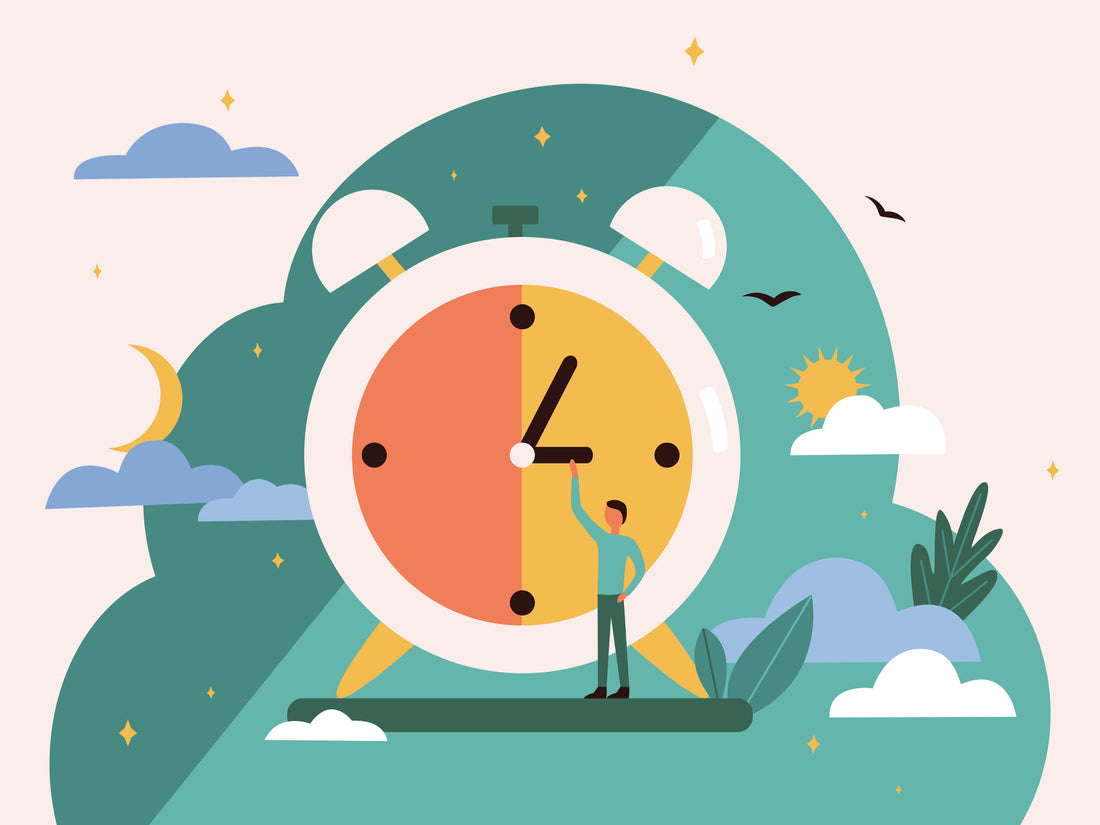How To Wake Up Without An Alarm Clock

Key Points
- Waking up with an alarm can raise your blood pressure and heart rate and affect your mood.
- The average adult should sleep between 7 - 9 hours each day. Teenagers should sleep more, around 8 - 10 hours.
- The best way to wake up without an alarm is to develop a nighttime and morning routine which trains your body clock.
- Avoid using electronics before bed, as they can stress you out and delay your body’s production of melatonin.
- While developing a new sleep routine, you must be patient and consistent.
Waking up can be tough. Late at night, when we’re scrolling on our phones, we rarely think about the next morning and how we’ll regret using this time instead of starting to go to sleep. So we rely on alarms, which become part of our routine to ensure we don’t oversleep and miss work or school. Alarms are so common that most people can hardly imagine waking up without a violent noise jolting them out of bed.
Wouldn’t it be nice to wake up without an alarm? Instead of waking up all disorientated, you'd slowly rise, having got the perfect amount of sleep.
Waking up well, and not being shaken awake by an alarm, can allow you to start your day on the right note, be more productive and have a more optimistic outlook.

Using An Alarm Can Be Bad
Using an alarm might seem innocuous, but it can damage your health. The National Institute of Industrial Health in Japan discovered that participants who were jolted awake by an alarm had higher blood pressure and a higher heart rate due to the alarm interrupting their sleep cycles [1].
Using an alarm can cause you to start your day on the wrong foot and make you less sociable. If you’re experiencing the negative side effects of an alarm clock, you might be interested in learning how to wake up without one.
How Much Sleep Do I Need?
So how much sleep should we be aiming for? It’s not a simple question to answer, as there isn’t a one-size-fits-all solution. People need different amounts of sleep depending on their circumstances, but adults generally need between 7 - 9 hours of sleep a day, while teenagers need between 8 - 10 hours.
To figure out the right amount for you, you should pay attention to how much sleep you get over a week and how many hours you get consistently. If it is below your demographic’s threshold, you’ll need to start getting more sleep. Getting more sleep can make you more social, outgoing and productive.
You might not get the right amount of sleep for many reasons. Perhaps you're out late or putting off sleep to watch something. However, other reasons are more serious, like stress, anxiety, chronic pain, sleep apnea, depression or parasomnias, such as sleepwalking.

Before You Sleep
There are several ways to improve your sleep schedule and start waking up without being jolted awake and uncomfortable. You can do several things before going to sleep, which can help you wake up without an alarm clock.
Set a Sleep Schedule
Going to sleep and waking up at the same time every day is the most surefire way to get those 7 - 9 hours of sleep. If you establish a routine around sleeping, your body will start to wake up naturally at the same time every day.
Try keeping a sleep diary for a week or more to note when you wake up and go to sleep. This will help you plan a schedule and get you those important 7 - 9 hours of sleep without disrupting your circadian rhythm.
We often refer to the circadian rhythm as our internal body clock. The circadian rhythm helps regulate our body temperature, hormone release, and heart rate. Maintaining a consistent sleep schedule can help ensure your health.
Once you figure out your schedule, you must adhere to it as strictly as possible, there will be days which will be harder to maintain the schedule, such as during weekends, but you must try to stick to it as hard as possible as consistency is key. Once you get those consistent 7 - 9 hours of sleep, you'll enjoy the day more and start waking up more refreshed.
Have a Nighttime Routine
As well as scheduling when you go to sleep and wake up, you should start mentally preparing your body before you go to bed. A good nighttime routine can help you wind down from a long gruelling day and destress you.
There are many things you can do as part of a nighttime ritual. Such as reading a nice book, enjoying a warm bath, and drinking herbal tea. All these things can signal to your brain that it's time to go to sleep. If you consistently do these things for long enough, they become a habit that your brain expects and can associate these activities with bedtime.
Try to focus on calming activities which won't trigger any stress. Avoid watching the news or being on your phone too much, as you might stumble upon an article which might give you anxiety. Try to avoid caffeine past midday.
It's best not to nap during the day as this can disrupt your circadian rhythm. In the build-up to going to sleep, try to have a light dinner.
If one activity doesn't work, try another until you find the right routine. Finding the perfect nighttime ritual can take some time but discovering it will help you get to sleep and anticipate your sleep schedule. Ensuring you're getting those all-important 7 - 9 hours.

Avoid Bluelight
Bluelight is the light emitted from screens such as laptops and phones. According to a Cleveland Clinic [2] study, blue light can halt melatonin production and make you feel alert. This makes it much harder to get to sleep and can limit your sleeping hours, so you're more reliant on an alarm clock.
Try to avoid electronics in general in the last 30 minutes before bed but especially avoid blue light around this time. Set a cut-off time from technology and ensure you keep away. It's probably best to move the phone out of reach from your bed as you might be tempted to have a quick peek on social media, which can stress you out or keep your mind stimulated when it should be calm.
Light is a crucial part of the sleep schedule, so it could be a good idea to slowly dim the lights throughout the evening to make yourself anticipate sleep.
Try B・SYNC ON
B・SYNC ON is the first clinically proven wake-up tablet. It can help you start the day correctly, wake up easier and elevate your mood. This tablet is an innovative way to help you wake up without an alarm clock while getting the right amount of sleep. All you have to do is take one tablet when you go to sleep, and in around 7 hours, it will start releasing energising nutrients, gradually waking you up naturally and leaving you feeling fresh, calm and happy.
Take B・SYNC ON regularly and align it with your circadian rhythm to benefit from the tablet. You can use this pill with your sleep schedule and as part of your nighttime routine to ensure you get enough sleep and start the day right. B・SYNC ON is made of four all-natural ingredients, so you don't have to worry about chemical interference with your body.

What To Do When You Wake Up
Waking up with an alarm can be horrible. You're jolted awake and left feeling dazed and disorientated for the rest of the day. There are a few tried and true methods that can wake you up properly and start your day right.
Get Some Natural Light
Just as Blue Light is bad for you in the evening, natural light is good for you in the morning. When exposed to the sun, your body stops producing melatonin which will make you feel less sleepy. So exposing yourself to the sun tells your body it's time to get up and go.
Tyler Woodward, a wellness expert from Eden's Gate, suggests that it might be a good idea to sleep with your curtains open, allowing light to slowly seep into your room and wake up according to the sunlight [3]. Of course, this is easier to do during the summer than the winter when the sun rises early, so you should keep in mind sun rising and setting time if you plan to sleep with your curtains open.
Exposing yourself to natural sunlight is good for your internal clock. Basking in the sunshine in the morning is a great way to start the day. Try getting outside in the morning and getting around 10 minutes of outside morning light each day. Very Well Health stated that morning sunlight could help you sleep better at night [4].
Establish A Morning Routine
An evening routine can help you get ready for bed and signal to your body that it's time to sleep. A morning routine can do the same thing and help you prepare for the day and wake up naturally without an alarm clock.
An infinite amount of things could be part of the morning routine. You can try splashing some cold water on your head, which brings more circulation to your head. Or perhaps you should try to stimulate your brain somehow, whether by doing a puzzle, reading a book or perhaps doing the newspaper crossword. Try doing a minor daily task to help your brain get into the right gear.
Another idea is to socialise with someone. Chatting with a friend or family means your brain has to be active and engaged. It doesn't have to be a long conversation; a quick chat can liven you up and help you prepare for the day ahead.
Music is another handy thing to incorporate into your morning routine. Music can motivate you and make you feel more alert. Try listening to positive, upbeat music, which will help you gently get in the mood and start the day on a good note.
A crucial part of a good morning routine is exercise. You don't have to exercise every morning, but the Hopkins Centre recommends you get around 30 - 40 minutes of aerobic exercise 3 - 4 times a week.[5] Regular exercise can improve sleep quality and help combat insomnia or other sleep disorders. Some good exercise ideas include going on a morning jog, bike ride or yoga. Any of these ideas can invigorate you and help you wake up naturally.
Whether your routine has you completing puzzles or out jogging, the most important element is consistency, which helps establish the routine and train your body. Once you figure out which routine works for you, stick with it, even if you don't get immediate effects. Slacking and deciding not to do your routine for even one day can affect your sleeping pattern.
Have breakfast
You know what they say, breakfast is the most important meal of the day. If you’re the sort of person that avoids breakfast, due to lack of time or just not fancying it, you should try rectifying that as soon as possible.
Eating a regular, nutrient-rich breakfast can wake you up and get you in the right mood. While you can have caffeine in the morning, it is best not to have it too much, and don't rely on it to zest your day up. Instead, Harvard Health recommends having a breakfast that includes proteins and whole grains. You can always try a breakfast smoothie if you don't have the time for a full breakfast [6].
You can incorporate your breakfast into your morning routine. A healthy breakfast can help get you up for the day ahead.

Final Thoughts
There is no simple answer to the question of "how to wake up without an alarm clock?" But thanks to new innovative technology, like B・SYNC ON, and developing consistent routines, you can figure out what works for you. As the American Academy of Sleep Medicine recommends, develop a routine that will get you between 7 - 9 hours of sleep [7].
Whichever method you try, be sure to be patient and not expect instant results. Give your schedule time to align slowly with your circadian rhythm, and don't be afraid to experiment with different ideas or alter your routine until you've perfected it. It can take weeks or even months for your body to adapt to its new schedule.
FAQs
How can I wake up at 3 am without an alarm?
If it is for a one-off wake-up at 3 am, you can try going to bed early, around 6 - 8 pm, to ensure you get 7 - 9 hours of sleep. If you plan on getting up at 3 am frequently, you should develop a routine that prepares your body clock for sleeping and waking up on a schedule. Tablets like B・SYNC ON can help you wake up naturally without an alarm.
Is it better to wake up naturally or with an alarm?
Waking up without an alarm can help strengthen your internal body clock and steady your heartbeat. A survey in Each Night shows that people who wake up without alarm clocks are better rested, more motivated and have a more positive mindset.[8]
Why do I struggle to wake up?
There are many different causes of sleep trouble. You might have sleep apnea, which stops people from breathing during sleep, or a sleep deficiency when you're not getting enough sleep. It would be best to get between 7 - 9 hours of sleep each night.
References
- https://pubmed.ncbi.nlm.nih.gov/15732320/
- https://health.clevelandclinic.org/put-the-phone-away-3-reasons-why-looking-at-it-before-bed-is-a-bad-habit
- https://metro.co.uk/2022/05/08/how-to-wake-yourself-up-naturally-without-an-alarm-16600427/.
- https://www.verywellhealth.com/morning-sunlight-exposure-3973908
- https://www.hopkinsmedicine.org/health/wellness-and-prevention/exercising-for-better-sleep
- https://www.health.harvard.edu/staying-healthy/4-ways-to-boost-your-energy-naturally-with-breakfast
- https://aasm.org/resources/pdf/pressroom/adult-sleep-duration-consensus.pdf
- https://www.cell.com/current-biology/fulltext/S0960-9822(13)00764-1







